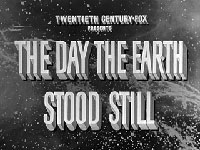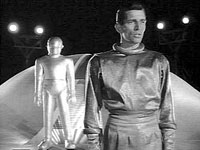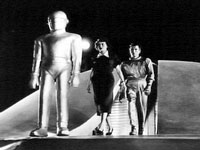PARALLAX REVIEWS:
The Day the Earth Stood Still (1951)
For Space.com


Directed by Robert Wise in 1951, The Day the Earth Stood Still is a cautionary tale about unregulated advancements in science in an era of nuclear power.
Klaatu (Michael Rennie), an interplanetary emissary of peace, lands in D.C. and offers a perfunctory "I come in peace" before proffering a mechanical device to the military. The army quickly shoots him, prompting his ill-tempered robot Gort (Lock Martin) to vaporize their weapons. Klaatu sadly picks up his broken device (a gift to our president) and is whisked away to a nearby hospital. After observation and a failed international meeting attempt, Klaatu flees the hospital and joins forces with beautiful widow, Helen (Patricia Neal, the Kate Mulgrew prototype), and her son Bobby (Billy Gray). He offers to look after Bobby while Helen is on a date with her beau, Tom (Hugh Marlowe). A day with Bobby is like a day with your worst enemy, but Klaatu has a great time. The military, as Klaatu discovers, is also having a great time trying to blowtorch his ship, which runs on a highly developed form of atomic power.
Klaatu befriends Professor Barnhard, the smartest man in Washington, by bemusedly correcting his celestial mechanics equations. After hearing Klaatu's problem (great speech, no audience), Barnhard offers to gather his international cronies and suggests a "dramatic not destructive" publicity display for the meeting. Klaatu elects to stop all power everywhere for half an hour, which enrages the military sufficiently to upgrade his search status to "dead or alive". By now Helen and Tom (via the helpful Bobby) have figured out that Klaatu is an alien. Tom nastily alerts the military, and Helen dashes off to warn Klaatu. While fleeing, Klaatu tells Helen he's worried about Gort, who will destroy our planet if anything happens to him (Klaatu). The words Helen is to utter to stop Gort in the event of Klaatu's death are "Klaatu - Barada - Nicto." Prophetically enough, Klaatu is killed by the military police mere seconds after dispersing this information.


Helen reaches Gort, who is happily vaporizing weapons and humans. She cowers and briefly faints before reciting the magical phrase. Gort stops his rampage, manhandles Helen aboard the ship, abducts Klaatu's body from the military, and resurrects him with a series of annoying high-pitched frequencies. The resurrected Klaatu emerges from the ship to the gathered audience below and delivers the finest speech ever presented by a sequined jumpsuit-clad speaker. With the advent of space travel through nuclear power, other planets felt the need to eliminate all forms of aggression by placing robots in charge as "keepers of the peace". These robots, including Gort, are instructed to use absolute force against aggression and will reduce Earth to a burnt-out cinder if we extend our violent ways into space. After delivering this bitter message, Klaatu waves to Helen and flies off into the great beyond. Mission complete.
Or is it? The Day the Earth Stood Still took place in the interim between the nuclear ending of World War II and the launching of the Russian satellite Sputnik in 1957. Interest and concern about scientific responsibility and space exploration was running high, and the science fiction genre, consequently, was thriving. In literature, Isaac Asimov's I, Robot (1950) addressed the need for moral boundaries in technology (the Rules of Robotics, which Gort flagrantly breaks), while Ray Bradbury furthered the desire for space exploration and the need for fundamental changes in human nature in The Martian Chronicles (1951). The films to come out of this time reflect some of the best (idealism and the exploration of realms unknown) and the worst (bug-eyed creatures and a pervading societal fear of technology) of the genre.
The Day the Earth Stood Still is a well-meaning film, and perhaps one of the best of the 1950's sci-fi classics. Its final message, to stop our conflicts with other countries and concentrate our energies towards space, is inherently noble, albeit somewhat naive. However the film chooses to deliver this idea in a bizarrely moralistic and contradictory way ("Be peaceful or we'll kill you"). Violence tends to beget violence, and the need for strong enforcers to secure peace is more of a military issue than a scientific one.
Finally, much has been made about the messianic qualities of Klaatu in this film (i.e. peaceful being is killed and rises from the dead). Ignoring the strange amalgamation of religion and science, Klaatu isn't offering humanity any viable choice: stop hopes of space exploration or have the remainder of our existence patrolled by cranky robots. Great choice, future messiah.
Links Away: